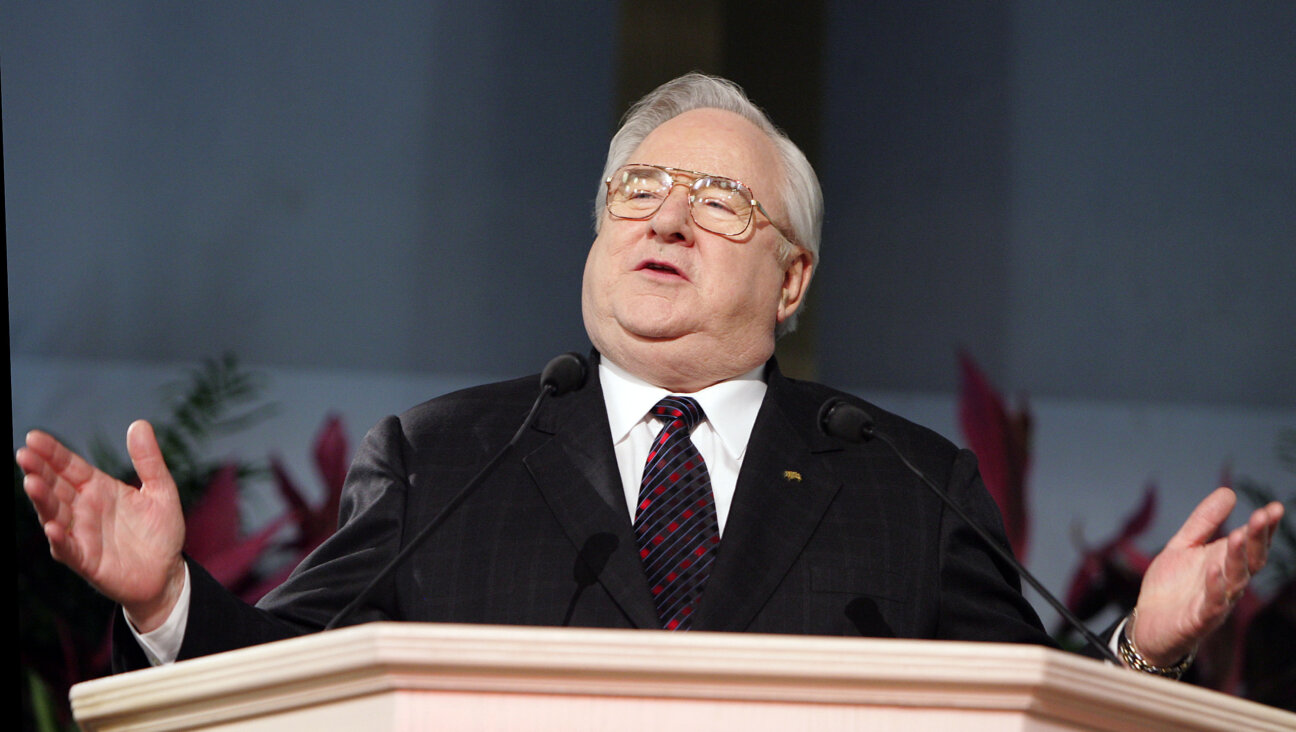Novel Jews
Each month, in coordination with our Novel Jews reading series in New York, the Forward publishes an excerpt from the work of that month’s series guest or guests. This month, we will feature readings by Gary Shteyngart and Josh Cohen (for full details, please see sidebar), and the excerpt we have chosen to highlight is from Cohen’s short story, “The Trial.”
May it please the Court:
Respected gentlemen of this heavenly jury, you have heard many things today. You have heard testimony — from parents, family, friends, acquaintances, even my client’s Evil Urge… and I caution you against considering His remarks… You have heard the grandiloquent closing statement of my esteemed and formidable colleague, the Prosecuting Angel. My own closing statement won’t be long, certainly not as sustained as that masterpiece of oratory just offered unto us, just placed high on the altar of your esteemed judgment, a sacrifice of much learning and thought. Still, it’s not enough, not worthy of you, of your purpose… The problem with all of my closing statements is that they’re always and necessarily shorter than the lives, or afterlives, they are intended to defend.
I will agree, somewhat, with the Prosecution: of late argumentative about everything other than matters pertaining wholly to his occupation, yes. Admittedly, he owed the candlemaker for a month’s worth, a debt which my client’s daughter has now paid from the sale of his chair and desk. Possessed of a wandering temper, yes. Innocent ad aeterna of any modesty that held no possibility of his temporal enrichment, okay, fine, yes.
But my client, Reb Schrieben, better known to you, learned gentlemen of the jury, as the Nachmachen, was nonetheless a man of estimable holiness. An ascetic, surely, though one whose asceticism raged only against the temptations of the world below ours, a world I’m sure you’ll all remember. In matters of the sacred, his heart was as superabundant and unyielding as his womenfolk would allow. How he married is not of interest to us… suffice to say he was kind to his wife while she lived her short life, as she stated unequivocally in her emotional testimony earlier, and I quote: He treated me as one would treat the Queen of Sheba, end quote. That would make my client a Solomon. Yes, the existence of personal miracles does not depend on the Nachmachen’s belief in them: he was once a kind and easygoing man. After the death of his wife, though, he believed only in work, or, more accurately — for his occupation necessitated a fanaticism for accuracy — he believed in service. That is his word, I remind you: “service.”
You have learned that he was a Sofer, a scribe, one who wrote the scrolls of the Law. But not writing exactly. The work was more like copying, the job of an applied student. He was the taker of murmuring dictation spoken long ago in a Land he would never walk three cubits upon. Instead, he sat in Josefka — which, if you should ever have the opportunity while on a terrestrial holiday, you should never visit — and he worked. Every letter he copied, every word. Look at his hands! Hold up your hands! 72 years he sat and did this and not mistake one, not even in infirmity and encroaching old age, not a slip.
Yes, what he did was rote, an animal’s work. Yes, what he did was an occupation directly opposed to the spirit of his own people, who did and made things, his people who redacted and reinvented and reinterpreted themselves every other long season, who flaunted the Second Commandment. But he did his job because somebody had to do it. And so why not him? I ask, why not a man whose talent never usurped his need? His task — as I am sure you’ll recall from your studies, however distant they are — his task is one of the most respected, even revered. His was a holy calling. You might think that he wrote, or copied, for himself only. That there was only one shul in Josefka and what did it need with hundreds of scrolls. That most of the scrolls in his hand, stayed in his hands. But, I ask you, is that not love? passion? The work is never over. How to trust your work to others with the ways down there these days?
And he was good as no one else was good — you’ve heard the expert testimony, my examination of the Rabbi’s son — yes, he was meticulously good. If God Himself — blessed be His name forever and ever and may He forgive the following heresy — made a mistake in the original, then there was a mistake in each and every one of the 612 scrolls the Nachmachen turned out. And, gentlemen of the heavenly jury, there’s a teaching to be found — I’m sure the venerable Prosecutor can tell you where exactly it isn’t — that runs that God didn’t make a mistake, to err is not divine. You remember: that God didn’t even write the thing. He dictated and Moses took it down, the great leader an unsalaried secretary, days long on Sinai. And so if there was a mistake, it was mortal. And if there was a mistake, then it was handed down: it was repeated through the generations unto generations in nearly immortal faithfulness. This is the holiness of the Sofer, striking a rock so ink issues forth. The Nachmachen, Moses’ distant successor, was also mortal. Mistakes he also made. But mistakes of what nature?
His life, then, an unfurling parchment: you will recall that in Josefka at that time, all the animals, all of them, had died. I refer you again to the testimony of the Rabbi’s son — these deaths are to be attributed to the milk. And so for a period there were no more animal skins. A few feathers for quills and the organic ingredients of the proscribed ink, he had. Skins, parchment, he didn’t. Again, the testimony of the Josefka Rabbi’s son, sorrowfully a recent addition to our ranks, also taken by the milk. This exhaustion of resources was a disaster for the Nachmachen, financially, and, more importantly, for his soul. The people would always require the Law and the Nachmachen required his parchment. No Law, remember, with no parchment… you want to talk about
sacrifices? As the Nachmachen testified, he initially spent some days on a new regimen, practicing particular ornaments one thousand times, evenly spaced, on his walls, never on his floors… Please understand, gentlemen of the jury, this man sanctified his skill. Dedicated it and rededicated it daily. No vanity here… or sometimes — we all can understand, I’m sure — humility and vanity become confused.
And so, with no resources with which to produce, or reproduce, the Law… and which is the true Law, the Sinai-original or some latter version? … with no parchment then, yes, the Nachmachen started on skin, human skin, not his own, the skin of Surly, short for Israel, the husband of his loving daughter, his son-in-law. He never dared attempt her skin, his daughter’s. Let it be remembered that the thought of uncovering her nakedness fevered him. That is the one remark his Evil Urge gave in His testimony that I believe to be veracious. She, his daughter, is still among the waking, thanks be to God. She is relatively young, and so we’re unable to have her testimony… remember that only the dead are allowed to remember all. Though this act of writing on skin was forbidden, the Nachmachen wrote and wrote. Such was his passion: Genesis on the right eyelid, Exodus on the left. Leviticus sloping down the nose. Deuteronomy across the upper lip as small hairs grew among the many repetitions and formulae. My client is and was aware of the prohibitions. How? Well, esteemed jury, had he not traced them maybe thousands of times? Is the sin not the repentance and the repentance not the sin?






















